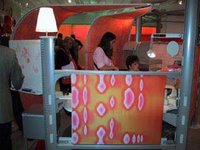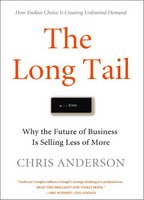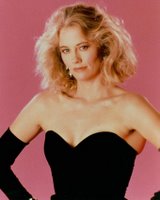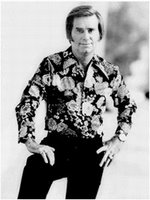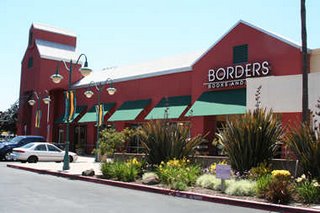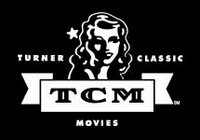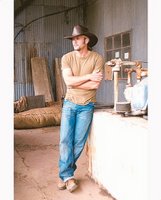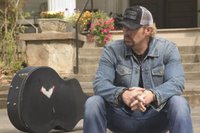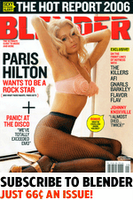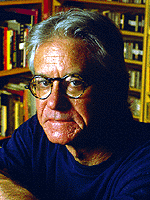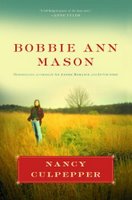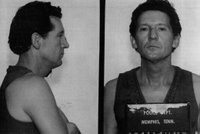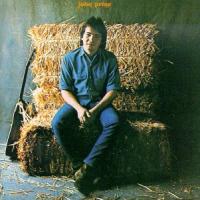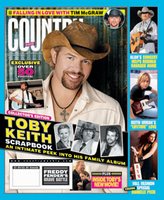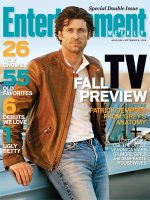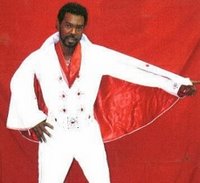 Went to Best Buy to buy the new Scissor Sisters CD and practically every aisle I turned down had a misfiled or filed correctly Elvis CD at eye level. What's going on?
Went to Best Buy to buy the new Scissor Sisters CD and practically every aisle I turned down had a misfiled or filed correctly Elvis CD at eye level. What's going on?
Friday, September 29, 2006
Sept. 28 - Elvis is everywhere at Best Buy
 Went to Best Buy to buy the new Scissor Sisters CD and practically every aisle I turned down had a misfiled or filed correctly Elvis CD at eye level. What's going on?
Went to Best Buy to buy the new Scissor Sisters CD and practically every aisle I turned down had a misfiled or filed correctly Elvis CD at eye level. What's going on?
Sept. 28 - Walking by a very well decorated cube
Thursday, September 28, 2006
Sept. 27 - And another playboy interview on line
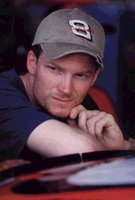
PLAYBOY: You have mixed feelings about fame, don't you?
EARNHARDT: It's mostly cool. The Charlotte Hornets asked me to come to a playoff game, and they had a number eight jersey for me with my name on it. I talked in an interview about being a big Elvis Presley fan, and I started getting Elvis stuff in the mail. A police officer in New Hampshire sent me an Elvis autograph, just to be nice. My sponsor sends me cases and cases of free Budweiser -- more than I can drink. I'm doing the Playboy Interview -- this is cool shit a lot of drivers don't get, and I recognize that. A lot of circumstances had to fall into place for all this to happen. I mean, three years ago nobody knew or cared who I was. Now people drive past my house just to look at it. Some of them knock on the door,
Wednesday, September 27, 2006
Sept. 27 - Another discount, this time upstairs

I was at Borders again tonight, had to go upstairs to the film books dept (which as moved as they have moved everything around in the store) and so walked by the bargain books and again there was a DIFFERENT Elvis book remaindered for $8 bucks which I did not buy.
I tried to find a different shot of Borders to illstrate this -- and this image came up. Seems like a good motto!
Sept. 27 - Not surprising mention
 Reading an on-line interview circa Kill Bill: I felt like Elvis when I was meeting girls on the festival circuit. I went crazy for a little bit -- a lot of making out. I love kissing. I'm a good kisser.
Reading an on-line interview circa Kill Bill: I felt like Elvis when I was meeting girls on the festival circuit. I went crazy for a little bit -- a lot of making out. I love kissing. I'm a good kisser.PLAYBOY: You started acting as an Elvis impersonator on The Golden Girls. What was it like, being near Bea Arthur with stars in your eyes?
TARANTINO: The job lasted two days, and what was fantastic was how much money I made. That was when I had no money whatsoever. All of a sudden I made $700 in a lump sum. You get it again when it's repeated. They liked that bit so much they put it in a "Best of the Golden Girls" episode. I got paid $700 for that. And then the show was in tremendous repeat mode, on NBC and in syndication. I had two episodes in repeat rotation and ended up making $2,500. Just when I was flat broke, a check would come in for $150, then $75, then $95. I got a check the other day for 85 cents.
PLAYBOY: How was your Elvis?
TARANTINO: I was the best of the bunch. The others were all the Vegas Elvis. I was the Sun Records Elvis, the hillbilly cat.
Sept. 26 - Does a visit to Graceland count?
Sept. 26 - Cybill kisses and tells
Sept. 25 - Old George Jones video on CMT Pure
Sunday, September 24, 2006
Sept. 24 - He is the Elvis of today
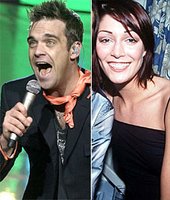
Someone from Robbie's hometown posted the following comment on an article about RW: Robbie is in a world similar to that of Elvis Presley. He is a very lonely young man. He just wants to love and be loved in return. There are many people around him but no-one there for him. He needs time-out. He needs to come back to Stoke-on-Trent where we can look after him. He can come and live with us anytime. Good luck for the future Robbie, and please do what is right for you, everyone else can go fiddle.
- Dawn Dobson, Bignall End, Stoke-on-Trent, England.
Sept. 23 - TCM ad in EW
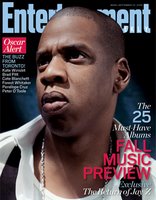 Not this EW but the subsequent battlestar galactica one, the cover of which is not yet on the EW website. There was a full page TCM ad for Jailhouse Rock. I can't remember the exact words, something like having a record as a jailbird is bad but getting a gold record out of it is classic. Or words to that effect.
Not this EW but the subsequent battlestar galactica one, the cover of which is not yet on the EW website. There was a full page TCM ad for Jailhouse Rock. I can't remember the exact words, something like having a record as a jailbird is bad but getting a gold record out of it is classic. Or words to that effect.
Thursday, September 21, 2006
Sept. 21 - YouTube again
 Okay, I spend way too much time watching Robbie William clips on YouTube, but you have to keep up since tons of new onces are added every day while he's on tour. Now he's complaining about his ex-Take That manager having a problem with his lyrics for his upcoming '90s song -- and one of the lyrics is "Elvis has left the building."
Okay, I spend way too much time watching Robbie William clips on YouTube, but you have to keep up since tons of new onces are added every day while he's on tour. Now he's complaining about his ex-Take That manager having a problem with his lyrics for his upcoming '90s song -- and one of the lyrics is "Elvis has left the building."
Sept 20 - An unexpected screensaver
Sept. 21 - VMA recap
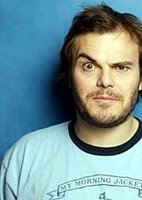 For work I was researching blogs on the MTV VMA awards and came upon this:
For work I was researching blogs on the MTV VMA awards and came upon this:8:09: Jack Black's overblown-ego shit tends to be fun for about five minutes and then unbearable afterwards, but we're in the good five minutes here, as he runs out in an astronaut costume, which catches on fire. Then, he's in an Elvis jumpsuit and singing some goofy metal song while sending up the whole epic-intro shtick; Montel Williams is somehow involved. I enjoyed this, but there's no way it'll work for the rest of the show.
Tuesday, September 19, 2006
Sept 19 - Accidental CD spotting
Sept 19 - Gossip article
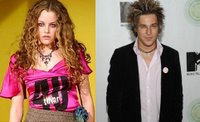 I followed a link about some other gossip story, but mixed in was this report: * Baby-faced pop star Ryan Cabrera is squiring his new girlfriend, rock star heiress Riley Keough, all over town. The former Mr. Ashlee Simpson was spotted at Denise Rich's home to applaud the newest 785 Records artist signing, then canoodled at new downtown hot spot Dirty Disco with Elvis' stunning granddaughter while Mandy Moore and Wilmer Valderrama looked on …
I followed a link about some other gossip story, but mixed in was this report: * Baby-faced pop star Ryan Cabrera is squiring his new girlfriend, rock star heiress Riley Keough, all over town. The former Mr. Ashlee Simpson was spotted at Denise Rich's home to applaud the newest 785 Records artist signing, then canoodled at new downtown hot spot Dirty Disco with Elvis' stunning granddaughter while Mandy Moore and Wilmer Valderrama looked on …
Monday, September 18, 2006
Sept 18 - An article on Mr. Zimmerman
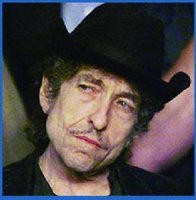
Someone forwarded this to me:
BOB ON BOB
by LOUIS MENAND
Dylan talks.
Issue of 2006-09-04
Posted 2006-08-28
“Bob Dylan: The Essential Interviews”—I’m not sure those are words that make the heart beat faster. Dylan nil a me alienum puto,” as Terence put it (or would have put it, if he had lived long enough): nothing having to do with Dylan can be alien to me. Still, as an interview subject, Dylan probably ranks a few notches above Elvis, who was one of the all-time worst. The trouble with Elvis was that he had very little to say; he was mainly concerned about sounding polite.
Sept. 18 - EW Pop Meter mention
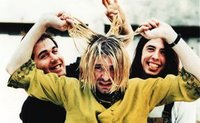
Another Nirvana anniversary...
It's hard to believe this date is upon us, but Sept. 24, 1991, is the 15th anniversary of Nirvana's Nevermind, the album that saved many a life, inspired many a band, put the final nail in the parachute-panted coffin of MC Hammer, and caused an entire generation to misspell a word. And while I love a good anniversary as much as the next gal (especially if it involves Elvis and/or that time Michael Jackson's hair caught on fire), this one feels just a little... much. Honestly, I'm still recovering from the 10th anniversary of Kurt Cobain's death, and I just don't feel like any more aspects of my troubled teenage existence need to be picked over for scraps by the rabid pop-culture hordes, at least not in five-year increments.
MTV, naturally, does not agree with me -- which would explain today's web feature, Could There Be Another Nirvana?
Author James Montgomery -- who, it must be said, is just doing his job -- first takes the time to explain to your 12-year-old little brother the significance of "The Year 1991," and then attempts to encapsulate Nirvana's musical significance before passing the mic to a motley crew of whoever Additional Reporter Chris Harris could grab on the red carpet at the VMAs or whatever. I'll let you read their answers for yourself, because I couldn't get past the first one: Panic! at the Disco's Ryan Ross, who responds, "I don't think it's impossible that we'll see another Nirvana in our lifetime. [Panic] were doing something different, and we've sort of sparked something in people."
I'm going to take a minute to compose myself now, but before I go, I'd like a stab at the question. Could there be another Nirvana? I'm pretty sure the correct answer is, "No, not so long as MTV keeps giving hipster snackpuffs like Panic! at the Disco airtime."
Someone wanna try to change my mind?
Sept. 18 - Elvis & Nora connection explained...
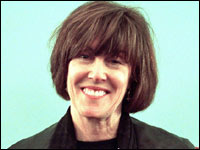
Searacing for Nora Ephron's directing credits on the web, saw she appeared on something called "Where's Elvis this Week?" -- which I never heard of. Looked it up, and it was described as: This British discussion show was taped in New York with popular American cable-TV host Jon Stewart at the helm. On each program, two guest stars -- one from the U.S., one from the U.K. -- discussed an important news event, with Stewart "translating" American slang and cultural references for the benefit of the Britisher. At the end of the program, a "remote broadcast" would announce where in the world the elusive (and dead) Elvis Presley had been spotted during the previous week. Debuting October 6, 1996, the series ran for a little over a year in England, and was briefly revived in the States a few years later. ~ Hal Erickson, All Movie Guide
Sept. 17 - What if Elvis hadn't died?
 From Sunday's LA Times: POP MUSIC
From Sunday's LA Times: POP MUSICIt can't be any more unusual
From sickly kid to scandalous stage dynamo to self-aware revivalist, old swivel hips is Sir Thomas Jones now -- but you can still call him Tom.
By Geoff Boucher, Times Staff Writer
The boy seemed destined to work in the dark. The son of a miner, he grew up in the 1940s under the bleak umbrella skies of South Wales in the village of Treforest, where local life was as hard as the coal and iron that sustained it. Thomas Jones Woodward was expected to join the other men in the mines, but tuberculosis changed that. He was bedridden for two years and then sent off to church with the girls to learn to sing.
He not only learned about singing, he learned about girls.
It was an unusual beginning for the boy who would grow up to be singer Tom Jones, a man more interesting on closer inspection than his cartoonish popular image as some singing gigolo in tight pants. He's gotten more respect from peers and younger artists than from critics (note his close friendship with the late Elvis Presley and, in recent years, his collaborations with Wyclef Jean, Tori Amos, Portishead and Trevor Horn). And while he is a regular on the Las Vegas circuit, he's shown a willingness to take risks that set him apart from Wayne Newton, Robert Goulet and other frozen-in-time fixtures on the Strip.
So now, at 66, Jones finds himself both hailed and dismissed, depending on who's around. On stage, his greatest challenge is finding the appropriate swivel for a sex symbol approaching the age when many other folks are contemplating hip replacements. To his credit, he does it with a sly smile. He has spoofed himself in "The Simpsons" and the Tim Burton film "Mars Attacks!" and knows the crowds he plays to now often sing along with a wink that wasn't there in the 1960s, when Jones was portrayed as a libidinous scandal as a club performer in London.
"That man, they called me," Jones said with a mock expression of finger-wagging outrage. "In 1964 I was playing at Beat City, a club on Oxford Street, and the Rolling Stones were playing too. They were catching on with the kids and they had been booked in this R&B club, so it was full of all these girls, maybe 14 and 15. I remember it was so hot. The paint was peeling off the roof. I just hit the stage. I burst out there. And the expressions on these girl's faces — I'm singing and thinking in my head, 'Don't worry, I won't hurt you.' "
Jagger and the Stones came out with their own brand of leer, but according to Jones, that didn't seem to scare young London or their parents as much as his leather-clad, sex panther approach. "Jagger looked effeminate and moved in an effeminate way. And the Beatles, they were boyish, with their lank hair and songs that were not aggressive. Mild. I was singing R&B and 1950s rock, intense like Jerry Lee Lewis, and putting my body into it. The reaction I got was: 'This man is dangerous!' "
*
Growing up Jones
EARLIER this year, Treforest's most famous son was summoned to Buckingham Palace to be knighted. It was a moment in the sun for the coal miner's son, to be sure, but Jones also has not had a Top 40 hit on the U.S. charts since 1988 and only two since 1971. That means he sometimes gets second billing even in his own house — he bought his Tudor-style mansion in Bel-Air in 1974 from Dean Martin, but is still hearing about the former owner.
"People say it all the time, they call it 'Dean Martin's house,' " he said with a bit of exasperation. "I've been there for years. I guess the only time the house is going to belong to me is when I sell it."
On a recent afternoon Jones dropped by Vibrato, a stylish jazz and supper club owned by Herb Alpert in Bel-Air. A few heads turned to check out the famous visitor. He arrived in a freshly pressed striped shirt that he wore untucked, a look that made his shoulders seem especially broad. He wore a thick gold necklace and some rings. His hair and beard are dyed to a deep ebony that, along with his California tan, bring attention to his pale blue eyes.
Jones has had surgery to keep his face taut (he has been quoted in the British press, in fact, saying that his doctor has cautioned him against further work) but his physique remains a marvel. At his Hollywood Bowl show this summer, he raised his silk shirt at one point and flashed his stomach; the crowd of course went wild, just as they did back at the clubs of London in the 1960s. There are some differences now. Boxer shorts are among the undergarments thrown on stage, for one thing, and it's hard to imagine that 40 years ago the manly Jones would have greeted that delivery with a shrug and a smile as he does now.
Jones had been signed to Decca Records in 1964, but his first single, "Chills and Fever," was ignored, and the BBC informed Jones that his lascivious sort was not welcome on the airwaves. The B-side was a curious song that departed from his raw R&B leanings with its brass and polished arrangement: "It's Not Unusual" was actually dramatically unusual for England in that year of the Fab Four's reign, and it only became a hit after an offshore pirate station called Radio Caroline latched onto it with a passion. The BBC eventually had to let a gleeful Jones on the popular TV series "Top of the Pops" when his song hit No. 1.
"That song, it just took on a life of its own," Jones said. "I had to add brass to my band because everyone wanted to hear that song and the music started going into a direction I wasn't expecting. I was an R&B guy."
It led to the even quirkier song "What's New Pussycat?," written by Burt Bacharach and Hal David for the 1965 film starring Woody Allen. In London, Jones rushed to meet with Bacharach. The singer's jaw dropped when he heard its oddball melody, jagged stop-and-start quality and leering baby-talk lyrics.
"He sat at the piano and played 'What's New Pussycat?' and I just looked at him. I thought he was pulling my leg. I really did. I wanted to say, 'Please, I can't do this,' but he's Burt Bacharach, right? You can't say no. But I thought he was absolutely nuts."
The result: A big hit. The same year, Jones scored with "Thunderball," the theme song to the James Bond film of the same title. Composer John Barry teamed up with lyricist Don Black for a bombastic song that, it should be noted, makes absolutely no sense. As Jones said: "There is no character named Thunderball in the movie, but the song tells the story of this guy. It's not James Bond, it's not the bad guy. I don't know what to tell you. I think he just liked it because it rhymed."
Regardless, Jones, who had dropped out of school in 1956 and wasted a few years in dead-end jobs (one of them was as a door-to-door vacuum cleaner salesman), was a certifiable pop star. He needed, the money, too. He had married Linda Tenchard, a Treforest girl, in 1957 when both were just 16 and the pregnancy that prompted the wedding made him a father the same year.
"It made me stronger, to be a father so young, it gave me something to prove and made me get out and do something," he said. "I had been getting in fights in pubs and just being a teenager, but after that — becoming a father — I had to think twice before I got in scrapes."
The couple is still married today, which pops up on that list of surprises about Jones. His fidelity has been the topic of gossip columns and a few legal actions, but just maintaining a marriage runs counter to the general perception of the singer. He says, though, that in the early years his aggressive onstage manner was more about music passion. Either way, it came off as caged lust and made Jones the most overtly sexualized pop star on the scene, two decades before Madonna ever laced up.
"I felt I had to attack when I was on stage and just grab the audience. I wanted the songs to explode," Jones said, making pop music quite a bit like hand-to-hand combat. In fact, on stage, Jones sometimes looks like a boxer going through a workout — he pumps his arms, treads in place like a man on a StairMaster and whips his head — and sometimes when he sings he leans his head back and his eyes go wide as if he's surprised by the sound coming out of him.
"He has, without a doubt, one of the strongest voices in all of music and a great sense of how to put his own stamp on a song, to make it his own," said Bacharach. "Tom is one of a kind."
Jones won the best new artist Grammy for 1965 and over the next few years he notched more hits with the forlorn and melodramatic ballad "Green, Green Grass of Home," the fiery "Delilah" and "Help Yourself." In 1969, he got his own prime-time TV show, "This Is Tom Jones," that aired on both sides of the Atlantic. In the 1970s he went Vegas and the new hits dried up. But his friendship with Presley, his idol, blossomed in the desert city and Jones said he took the icon's death especially hard.
"I had tried to reach him a few times in the weeks before he died and couldn't get through. I left messages but didn't hear back," Jones said. "If I had known how bad things had gotten or knew I could have helped somehow, I would have dropped everything and gone to Memphis. I still wonder if I could have helped in some way. When I was around he seemed to be more relaxed and energized. He knew how much I admired him and he liked how much I modeled myself on him."
*
Keeping it fresh
THE third act of Jones' career has been as either tongue-in-cheek imitator of his legacy or experimental collaborator — hip-hop, electronica, old Delta blues, 1980s alternative rock … Jones has played with all of them, with varying degrees of success. The biggest hit was his version of "Kiss," Prince's syncopated flirtation. It was put together by the Art of Noise.
"When I heard Prince do 'Kiss' I thought, 'This is an R&B song.' He just did it real sparse and with falsetto, God bless him, that gave me room to change it and do my own thing with it. The Art of Noise made it really special; when I heard the finished product I knew we got it right."
There's a flip side to the collaborations and the willingness to veer across the music landscape for his next experiment: Jones seems uncertain of his own judgments of music and instead seeks out people to make those material and taste decisions for him. For a man with a famously powerful voice, he often needs someone to tell him what to say musically.
"I like working with young musicians, they have fresh ideas," Jones said. "That's what has to happen. The people that wrote songs for me in the 1960s and the 1970s, they're not writing for today's market anymore. The same with the musicians — it's going to sound like it did then. It just doesn't fly today."
Needing guidance is not the same as not having a clue. Jones is smart enough to look around and recognize when his generational peers make a musical mistake by looking like an old man wearing a young man's clothes. "Look, you knew that Pat Boone didn't really like heavy metal. For me, I look for people to work with and then I just sing it the way I sing."
*
Forged by experience
SIPPING champagne at Alpert's club, Jones noticed three blond women ascending the steps to the second floor of Vibrato and his chin traced their path. He smiled and arched his eyebrows. Then he turned to the subject of his childhood malady and how those long months in bed listening to American rock 'n' roll and staring at the other kids outside shaped him.
"There's a lot of where I grew up that's still in me, and the main thing is I appreciate everything maybe more than some other people," he said. "To be there in that bed for so long, watching everyone outside, everyone walking and running and just living, it made me not want to waste a single minute."
He returned to South Wales last year for a 65th birthday celebration and 25,000 locals turned out to hear him sing the old songs and some of his new ones, which include some earthy blues classics recorded with Jools Holland, formerly of Squeeze, and the hip-hop fusion album he did with Wyclef Jean that even has Jones rapping.
In June, Jones sang "Thunderball" at the American Film Institute tribute to Sir Sean Connery at the Kodak Theatre. On his tuxedo lapel, the singer wore a red-striped ribbon and medal indicating his recent knighthood. It caught the eye of Connery's son, who said he hadn't seen one before.
"I told him that's because I got everything. There's a list of stuff, right. There's things you wear for different occasions, and I bought all of it. Medals, cufflinks, tie-pin … everything."
For the miner's son, the visit to Buckingham Palace to become a knight of the realm was an emotional life moment, but (despite dropping a lot of cash on the accessories) he is not one of those knights who insist on being called "sir."
"I think Ben Kingsley is the only who does that, you know, corrects people on it," Jones said. "I mean, Mick Jagger doesn't, Elton John doesn't."
Jones said he often thinks about being the sickly child who stared out his window at the other kids charging up the hillsides of Treforest and he counts his blessings. "When you're a kid … you never think to yourself, I'm so glad I can run up this mountain, you just do it. Me, I was always glad and smiling when I could finally run up that mountain."
*
------------------------------------------------------------------------
Sept 15 - In the bookstore
Tuesday, September 12, 2006
Monday, September 11, 2006
Sept 11 - 100 Years of Movies
Sept. 11 - He's not only bringing "sexy" back
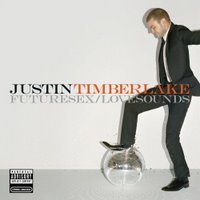
From the LA Times review: When Justin Timberlake's sophomore disc debuts at No. 1 on the chart next week, the Beatles era will officially be over. It's been coming for a while, with the rise of hip-hop and the relegation of most rock to the sidelines in terms of innovation. But Timberlake, who started out as part of a prefab Fab Five during the last gasp of Beatle-esque teeny-bop, means to ring in a new paradigm.
In Timberlake's new age, the Fab Four are Kraftwerk, those synth-playing German humanoids who laid the groundwork for modern dance music. And instead of Elvis, there's the Midwestern, biracial multi-instrumentalist currently known as Prince.
Foregrounding those forebears changes the rules. Old ideas like authenticity and straightforward song craft go out the window in favor of the dense collage effect of "abstract" hip-hop and the hallucinatory groove of post-rave-era dance music.
Instead of a white guy "reinterpreting" black traditions, Timberlake and his artistic soul mate — zeitgeist-ruling producer Timbaland — stand as equals in creating a sound that's partly avant-rock and partly New Wave soul.
OK, I'm exaggerating the importance of "FutureSex/LoveSounds." But it's a heck of a potential hit machine. No performer in Timberlake's position — totally mainstream, movie-star girlfriend, endorsed by teens, moms and McDonald's — has released such a confidently experimental disc. (There's one cautious move — a Rick Rubin-produced ballad — but it ends the disc like an afterthought.)
From the introductory space jam to the Plasticine gospel of the anti-crack ballad "Losing My Way," through the syrupy Three Six Mafia cameo "Chop Me Up" and the guitars-on-Mars ballad "What Goes Around … ," the two Tims buzz through their futuristic soundscape like the Jetsons on holiday. Will.I.Am drops in for a surprisingly tasty track (though his rhyme's a bit tongue-tied), but even then, Timbaland's showily modern spirit steers the mood.
It's sometimes hard to know where Timbaland's vision begins and Timberlake's ends. The producer manipulates the singer's voice as if it's a universal screwdriver, loosening up every arrangement. And that voice, dwelling in falsetto or growing breathy with desire, often overcomes the mix's mechanistic tendencies.
"FutureSex/LoveSounds" isn't an easy listen at first. Its crazy layers meld together into a sticky bit of a mess, and the lyrics are mostly standard love stuff. But repeated listening helps the tunes unravel. The new dimension they herald may prove to be a side road or a yellow brick one, but either way, it's worth a walk.
Sunday, September 10, 2006
Sept. 10 - First line in review of new Toby Keith movie
Sept 10 - P. 49
Saturday, September 09, 2006
Sept. 9 - New book by Greil
Sept. 7 - Who knew?
Wednesday, September 06, 2006
Sept 6 - Bob & Elvis
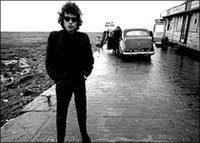
This was reported in E!Online in regards to Mr. Dylan topping the charts again: The three-decade interlude between chart-toppers is a Billboard record. Rod Stewart had a 25-year gap between number ones, Santana and the Isley Brothers both had 28-year spans, and Barry Manilow went 29 years between number ones. (Among defunct acts, the Beatles went 22 years and Elvis Presley 29 years between chart-toppers.)
Sept. 6 - Conversation with the Killer
Tuesday, September 05, 2006
Sept 5 - Big Old Goofy World
Sept 5 - Plates, plates, plates!
Sept 5 - A Guilty Pleasure?
Sept 4 - Reading back issues
Sunday, September 03, 2006
Sept. 3 - Andy Warhol display
Sept 2 - My Brother's Wedding Music Playlist
Friday, September 01, 2006
August 28 - Two Oblique References
August 29 - Can't remember the name of the film
Sept 1 - While under the dryer
Subscribe to:
Comments (Atom)
